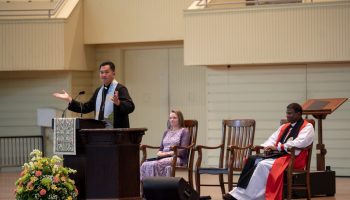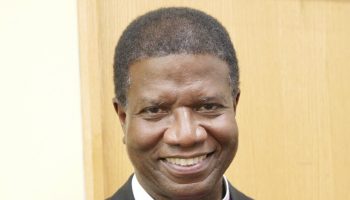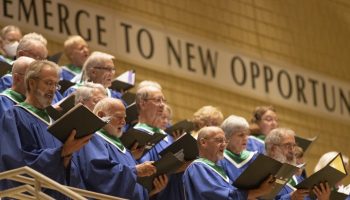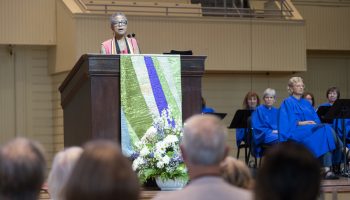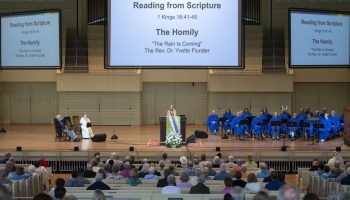“The mystics wrote more extensively about the Song of Solomon, or called the Song of Songs, than any other book in the Bible,” said the Rev. Margaret Bullitt-Jonas. “We often hear it at weddings and think of it as songs between two lovers. The mystics read it as songs between God and the soul.”
Bullitt-Jonas preached at the Friday, July 3, morning devotional on CHQ Assembly. Her title was “Faith for the Earth: What Will Sustain Us in the Struggles Ahead?” The scripture text was Song of Solomon 2:10-13 (NRSV).
“My beloved speaks and says to me: / ‘Arise, my love, my fair one, / and come away; / for now the winter is past, / the rain is over and gone. / The flowers appear on the earth; / the time of singing has come, / and the voice of the turtledove / is heard in our land. / The fig tree puts forth its figs, / and the vines are in blossom; / they give forth fragrance. / Arise, my love, my fair one, / and come away.’”
Bullitt-Jonas told the virtual congregation that “as a species, we are racing down a suicidal path, killing the web of life.” What is the answer to this situation? “‘Arise my love, my fair one, and come away with me,’” she quoted.
God is a lover, always reaching out to humanity, always longing “for us to stay in relationship with each other, with God, with the web of life,” she said. “This is the dance of the Trinity: the Lover, the Beloved and the Love that flows between.”
The inner voice of love is quiet. “We can hardly hear it over the noise and we can hardly sense it when we are gripped by fear or alarm or depression,” she said.
The antidote is to practice prayer, she said to the congregation. “To steady our minds we have to listen for the love singing in our hearts. We need a holy Someone, with a capital S. ‘Arise and come away’ is the voice of Jesus, the Spirit and God.”
From what do we need to arise? “We need to arise from apathy, numbness, agitation and hopelessness,” Bullitt-Jonas said. “God will give us strength to deal with loneliness because God says ‘I am with you.’”
The Holy Spirit, she said to the congregation, “tells us that we are precious, strong and loved. The Spirit leads us away from the path of destruction, from the lie that our efforts to save life are useless.”
Become a warrior for the common good. “Say to God, ‘I will come to protect life and a just society,’” she said.
Some people will protest the call. “‘I have no power.’ God says, ‘Arise.’ ‘It is too late to help.’ God says, ‘Arise.’ ‘I don’t have the time or energy.’ God says, ‘Arise.’ The voice of love is like that — soft but persistent, subtle but it never goes away,” Bullitt-Jonas said.
Holy love sends people into the world as warriors of truth and protectors of life. The call comes from the rocks, trees, wind, the orcas, the black bear, wolves, from strangers who are brothers and sisters we don’t know yet, she told the congregation.
“The call comes from the future, that it is depending on you to leave a habitable planet. Arise, my love and join to save this precious planet,” she said.
She continued, “We arise and join with indigenous people to protect the water, with activists to shut down oil pipelines, with city dwellers to restore community, with young and old to plant new forests. We are awakened by a fierce longing to join the dance of life.”
What can you do to join the dance of life? Bullitt-Jonas suggested cutting the use of fossil fuels, shifting to a plant-based diet, eating locally, composting, supporting your local land trust, getting to know a neighbor you have not spoken to yet, and being safely socially distant.
“This life is more about sharing than consuming, about generosity and not individual survival,” she said. She recommended livingthechange.net and werenew.net as resources for action.
She told the congregation, “We need systemic change; we need voices and votes. We must make politically possible what is scientifically necessary. We have to divest in fossil fuels and join faith-filled people in civil disobedience.”
She continued, “We are supported by the love of God and the power of community. When we join together and take risks, we connect with people and make more of a difference than we ever know. Thank you for what you are already doing. ‘Arise, my love, and come away.’”
The Rev. George Wirth, a retired Presbyterian minister from Atlanta, presided over the service that included a pre-recorded sermon in Chautauqua’s Hall of Christ. Chautauqua’s interim organist, Joshua Stafford, played “The Swan,” by Camille Saint-Saëns, as the prelude; the postlude was an improvisation on the Tallman Tracker Organ. He also played the hymn tune “How Great Thou Art.” Before the sermon, Robert A. Jonas played a rendition of “Moon over the Ruined Castle” on the shakuhachi. He said there were many renditions of this tune, including one by Thelonius Monk. Support for this week’s services was provided by the Geraldine M. and Frank E. McElree, Jr., Chaplaincy Fund and the John William Tyrell Endowment for Religion.


